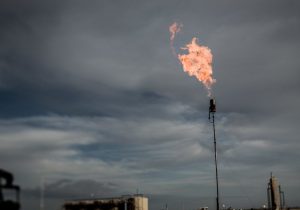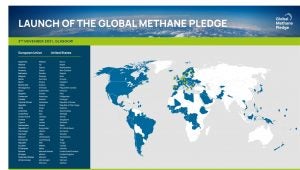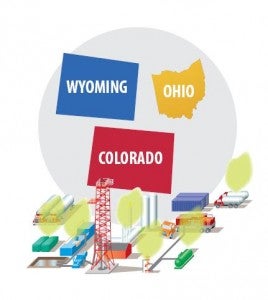 Russia’s war on Ukraine has sent painful shockwaves through global gas markets — not only in Europe but across Asia and in developing economies that can least afford it. The crisis is accelerating efforts to transition to cleaner, safer, more reliable energy, while setting off a scramble for new gas supplies to backfill what once came from Russia. How to meet that near-term need without a massive new infrastructure buildout that would undermine climate goals and risk stranding billions in capital? One key solution – identified by EDF, the International Energy Agency and others — lies in the vast amounts of gas currently wasted by the oil and gas industry through flaring, leaks and other emissions.
Russia’s war on Ukraine has sent painful shockwaves through global gas markets — not only in Europe but across Asia and in developing economies that can least afford it. The crisis is accelerating efforts to transition to cleaner, safer, more reliable energy, while setting off a scramble for new gas supplies to backfill what once came from Russia. How to meet that near-term need without a massive new infrastructure buildout that would undermine climate goals and risk stranding billions in capital? One key solution – identified by EDF, the International Energy Agency and others — lies in the vast amounts of gas currently wasted by the oil and gas industry through flaring, leaks and other emissions.
Energy Exchange
S&P Global Analysis Says Industry’s Wasted Gas Could Bring Quick Relief to Energy Market
Turning COP26 methane promises into action
 One of the biggest accomplishments from COP26 is the global consensus around the urgent need to reduce methane emissions. More than 100 countries representing more than two-thirds of the global economy promised to collectively reduce 30% of man-made methane emissions by 2030.
One of the biggest accomplishments from COP26 is the global consensus around the urgent need to reduce methane emissions. More than 100 countries representing more than two-thirds of the global economy promised to collectively reduce 30% of man-made methane emissions by 2030.
The agreement follows recent analysis from the Intergovernmental Panel on Climate Change, which warns there is no plausible pathway to limit temperature rise to 1.5°C without dramatic reductions in both methane emissions and carbon dioxide. We can’t get there through either pathway alone. We have to do both.
Methane standards are the law of the land; it’s time to stop litigation and start complying
 Let me first make this important point: I’ve met and worked with a lot of folks in the oil and gas industry who are truly dedicated to making their operations as safe and clean as possible – people who care about the communities they live and work in and who take pride in the reputation of the companies they work for.
Let me first make this important point: I’ve met and worked with a lot of folks in the oil and gas industry who are truly dedicated to making their operations as safe and clean as possible – people who care about the communities they live and work in and who take pride in the reputation of the companies they work for.
That said, I’ve always rolled my eyes a little when I see companies boast in sustainability reports that they comply with all applicable federal and state laws. Really? Not breaking the law is the high bar you’re shooting for?
But , as it turns out, one of the nation’s largest oil and gas trade associations is now saying that not only does it oppose common-sense laws requiring companies to reduce their emissions of methane and other harmful air pollution, it’s casting doubt on the extent to which companies should even comply.
The courts have repeatedly struck down efforts by the Trump administration and industry lobbyists to suspend these pollution standards. And these rules are now in full legal effect. Read More
Leading States Tackling Fugitive Emissions Problem Head-On
 You see something once, and it might just be an anomaly. See it twice, maybe coincidence. But when you see it a third time – that’s a pattern. A trend.
You see something once, and it might just be an anomaly. See it twice, maybe coincidence. But when you see it a third time – that’s a pattern. A trend.
With Ohio’s move last week to control “fugitive” emissions from oil and gas operations, that’s what we’re seeing – a rapid trend from leading states to control this major source of air and climate pollution. The Ohio rules come on heels of similar actions in Wyoming and Colorado. Together, these rules signal a fast-growing recognition that fugitive emissions are a problem that has to be dealt with, and that there are cost-effective ways we can slash these emissions today.
What LEED Did for Buildings, This Could do for Shale Gas Production
 This commentary originally appeared on our EDF Voices blog.
This commentary originally appeared on our EDF Voices blog.
The Center for Sustainable Shale Development (CSSD) put out the Open For Business sign today – a key milestone in this innovative effort to up the game on environmental protection in shale gas development. The question now is, will energy companies step up?
We hope so.
CSSD is an unprecedented collaboration – bringing together environmental groups, philanthropic organizations and energy companies to develop performance standards for reducing environmental impacts from shale gas production, and setting up a system so gas producers can have their operations audited and certified against those standards.
CSSD isn’t a substitute for effective regulation. Strong rules and robust oversight is a nonnegotiable bottom line. But we like the idea of upping the ante. Why not have a program that recognizes companies for going beyond the regulatory minimums and doing more to protect communities and the environment? These companies are tough competitors – so let’s make environmental performance part of what they compete on. Read More
Is BLM Phoning It In?
Yesterday the Bureau of Land Management (BLM) released a new draft of its so-called “fracking rule.” To be fair, the proposed rule does represent a level of progress compared to sorely outdated rules on the books. But we’re dealing with critical issues here – not the kinds of things we can afford to only get half right. And unfortunately, “half right” is about all we got here.
The most significant failings of the proposed rule have to do with well integrity – the way an oil or gas well is constructed and operated to minimize risks to the environment and public safety. Proper casing, cementing and pressure management are critical to protecting groundwater resources and the lives of the men and women who work the rigs. The rule takes steps in the right direction, but it doesn’t include nearly the level of detail necessary to ensure casing is set where it’s needed, operators are getting good cement jobs and the whole system is checked for mechanical integrity at critical points in the well development process.
The rule also falls short on chemical disclosure. We’re pleased to see the agency propose the same basic disclosure framework that has already been established by leading states – including requirements that operators disclose all chemicals used in hydraulic fracturing fluids (not just chemicals subject to OSHA reporting), and requirements to post the information on a user-friendly, publicly accessible website like FracFocus. But the proposal is far too weak on trade secrets. For the public to have confidence trade secret protections aren’t being abused, there needs to be a clear path for challenging trade secret assertions and policing the system.
Finally, while we recognize that you can’t address every issue in a single rule, it’s still worth noting two areas where agency rules are in glaring need of an overhaul. First, BLM needs to improve its rules for the handling, storage and disposal of the huge volumes of wastewater produced by unconventional oil and gas operations (the proposed rule merely asks operators to submit a plan). Second, BLM needs to adopt requirements to minimize emissions of methane – a highly potent greenhouse gas – and other contaminants that create local and regional air quality problems like they’re seeing in Colorado and Wyoming. There’s long been talk of dealing with methane emissions at BLM, but so far we’ve yet to see action. We hope that changes soon. Read More










